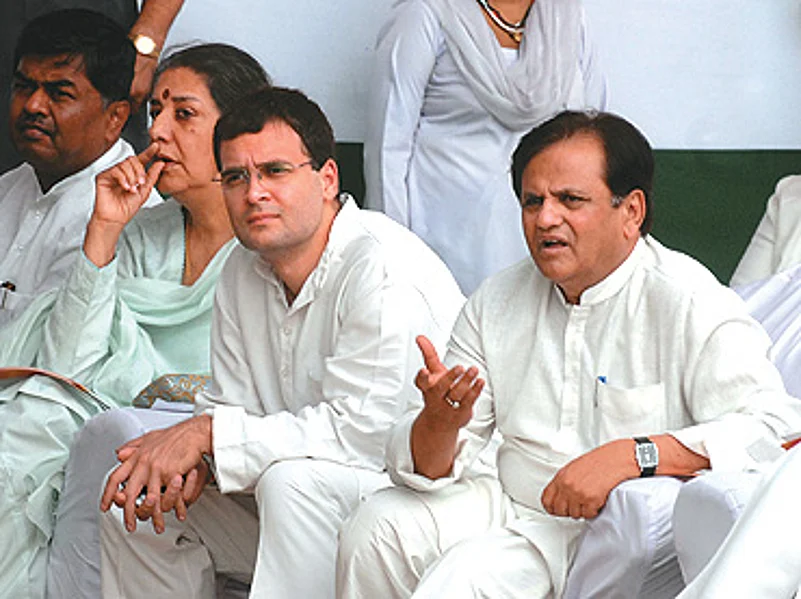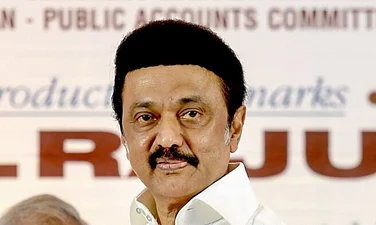—Congress manifesto, 2009
Competing visions of nationalism may separate the Indian National Congress from its arch rival, the Bharatiya Janata Party, but in 2009, the two parties appear to be united in their common resolve to rid the electoral arena of small parties with big ambitions. They would prefer to see the political parties in the ever-expanding Left-led Third Front either gravitate to the Congress camp or be herded back into the BJP enclosure. They want this election, and if not this one, at least the next election to be a straight contest between the Congress and the BJP.
A senior Congress functionary described the current elections "as a turf war" between the party and the Third Front. Union external affairs minister Pranab Mukherjee, who was officially fielded to attack the Third Front, stressed that it only spelt opportunism and instability. Simultaneously, a top BJP strategist was saying he'd like to ensure that the BJD in Orissa and the TDP in Andhra Pradesh were marginalised in these elections: "That will break the back of the Third Front," he told Outlook, "and push the Left back into the Congress camp." Clearly, there is a convergence of views on the Third Front, a "long-term view of politics" among leaders of the two major national parties. Many of them are saying the real battle will be fought in 2014 or even earlier, as neither expects the next government to last its full term.
So what are the Congress's "long-term plans"? In 2004, the Congress, in keeping with the party's Shimla resolution entered (for the first time) into electoral arrangements with regional parties in Bihar, Andhra Pradesh, Maharashtra and Tamil Nadu, which alone brought 121 seats into its electoral kitty. In the run-up to the polls in 2009, its alliances in Bihar with the Rashtriya Janata Dal and Lok Janshakti Party and in Andhra with the Telangana Rashtra Samiti have come undone. In Tamil Nadu, it stands diminished: the MDMK of Vaiko walked out a long time back, and the PMK (at the time of writing) appeared to be on the verge of switching sides—the DMK was the only one still a partner.
This clearly should have been cause for despondency in the Congress. But in a curious way, the fact that the party will have to plunge into the electoral fray virtually alone in the 120 seats that comprise Bihar and UP (the SP has left just four seats in UP for the Congress) has galvanised party workers: indeed, it was greeted with great jubilation at the party headquarters in Delhi. This, even though the Congress has not visibly grown on the ground in the two Hindi heartland states in the last five years and the edge the UPA appeared to have nationally at the start of the campaign has vanished. The elections have been thrown wide open.
Inexplicably, the Congress is today making out as though it has already won the elections. What explains this? Well, it is the logical outcome to the decision the Congress Working Committee took on January 29 this year, when it decided the party would not have any national-level alliance with any party, restricting itself to electoral arrangements in a few states. In short, it wanted to go it alone, not as the UPA. The Congress's first attempt at a national-level coalition, the UPA, may have worked smoothly, but the party has never really been comfortable working within the framework of coalition politics.
Providing perspective to the current jubilation, party seniors explain that this provides them with an opportunity to build the party, especially in areas where it has virtually disappeared. With the Congress graph in UP and Bihar plunging to near-zilch, the party feared it was heading towards the 'Tamil Naduisation' of these two states, forever dependent on a regional party to win seats. Just as any party wishing to make an electoral mark in Tamil Nadu has to perforce team up either with the DMK or AIADMK, the fear was that in UP, it would have no option but to ride piggyback on either the SP or BSP; and in Bihar, either the RJD or JD(U).
Party spokesperson Mohan Prakash stresses that the decision to have alliances in 2004 was out of compulsion: pointing to 1989, he says that though the Congress emerged as the single largest party, it chose to sit in the opposition. Again, in 1996, after the BJP failed to form a government, it could have staked its claim but it decided "to back the United Front government from outside". That changed in 2004. The BJP-led NDA had been in power since 1998 and it was, says Prakash, "taking the country in the wrong direction and we had to intervene. So we formed a coalition to run a government. But that was not meant to be a permanent arrangement".
Of course, there are some people—though they are outnumbered—who feel the realities of coalition politics must be accepted. "The Congress, like the BJP, wants the small parties to disappear. But that's not possible," a former Union minister who's now in the Congress told Outlook, stressing that "the day the Congress announced it was not going to go as the UPA, it lost the game. The UPA was like an earth station into which all the allies were docking in. Once you destroy the earth station, everyone will go spinning off in different directions." The RJD and the LJP, for instance, he says, could head off to the Third Front after the polls if that suits them better—there is nothing to tie them down to the UPA.
Interestingly, one person who is believed to be unhappy with talks having broken down in UP and Bihar is Prime Minister Manmohan Singh himself. Party sources say that it was the PM who had personally brokered the arrangement with the SP in 2008, when the Left parties had withdrawn support. Dr Singh also had cordial relations with RJD boss Laloo Prasad Yadav and LJP leader Ram Vilas Paswan, both ministers in his cabinet.

Go it alone: Rahul Gandhi flanked by Ahmed Patel, Ambika Soni
So, who is leading the "go it alone" charge? Well, the "credit" is being given to the party's heir apparent, Rahul Gandhi: in 2007, he had described the party's decision in 1996 to enter into an electoral arrangement with the BSP in UP as a blunder. That said, the present decision certainly has the stamp of approval of most of the party's top leaders. "We have nine seats in UP...we will retain or gain a few seats on our own," says a party leader, adding that "last time we won three seats in Bihar in coalition; this time, we'll retain that and even add a couple." (Realists in the party—even those who think the party cutting a lonely furrow is a worthwhile experiment—say the party may not get more than five seats in both states put together.)
Congress leaders are now loftily talking of choosing new partners after the elections: either the SP or the BSP in UP; either the RJD-LJP combine or the JD(U) in Bihar; either the DMK or the AIADMK in Tamil Nadu, depending on which of these parties fares better. But to be able to call the shots, the Congress would have to be ahead of both the BJP and the Third Front. By talking itself out of electoral arrangements in UP and Bihar, the Congress has not helped itself. It now will have to fight very hard to retain its current strength.
Can the Congress transcend this problem? Well, it can but only if it can turn this election into a "presidential" contest, between its prime ministerial candidate, Manmohan Singh and the BJP's nominee, L.K. Advani. The latter, the Congress points out, has thus far failed to enthuse either his own party cadre or the people at large. "In 2004, in Vajpayee, the BJP had an iconic figure as leader. There is no comparison between Advani and Vajpayee," says Congress general secretary Digvijay Singh, stressing that "the BJP is on a weak wicket as far as leadership goes this time." On the other hand, the Congress views Manmohan as an asset—someone who has moved from being on the margins of the party to centrestage, who has "grown in stature in office". The BJP strategists are aware of this and would therefore like the elections to be disaggregated, to be fought as a sum total of the states, on the reputations of its chief ministers—Narendra Modi, Shivraj Singh Chauhan and Raman Singh in particular.
The Congress wants 2009 to be fought on the strength of its achievements in the last five years—particularly on the social welfare front—and on the reputation of its prime minister. "We have the best prime ministerial candidate," a senior party functionary told Outlook, adding that "he is a man whom you can not only trust to steer the country through hard times in this era of an economic meltdown, but one whose secular credentials are impeccable." It's a credible enough claim. But is it enough in a make-or-break poll?


























